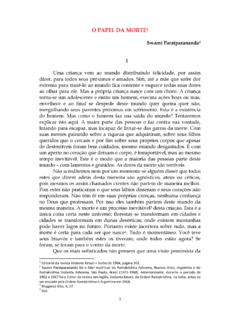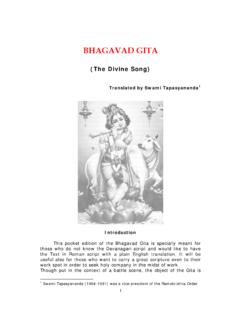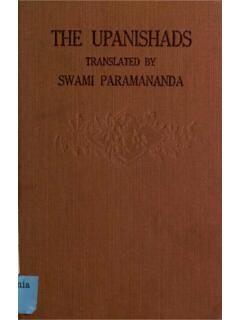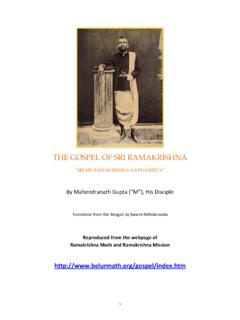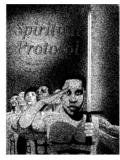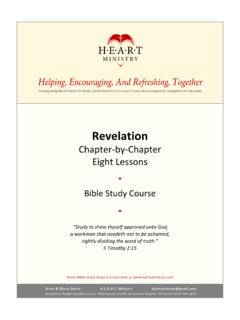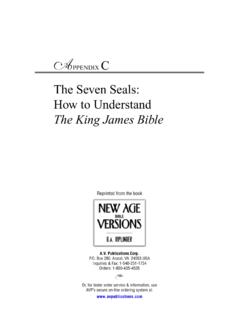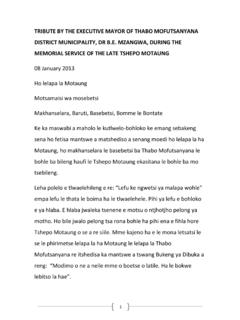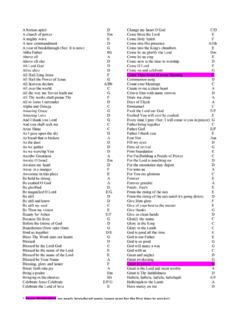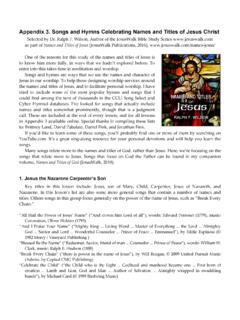Transcription of Adi Sankaracharya's VIVEKACHUDAMANI
1 Adi sankaracharya 'sVIVEKACHUDAMA NITranslated by Swami MadhavanandaPublished by Advaita Ashram, Kolkatta1. I bow to Govinda, whose nature is Bliss Supreme, who is the Sadguru, who can beknown only from the import of all Vedanta, and who is beyond the reach of speech For all beings a human birth is difficult to obtain, more so is a male body; rarer thanthat is Brahmanahood; rarer still is the attachment to the path of Vedic religion; higherthan this is erudition in the scriptures; discrimination between the Self and not-Self,Realisation, and continuing in a state of identity with Brahman these come next inorder.
2 (This kind of) Mukti (Liberation) is not to be attained except through the well-earned merits of a hundred crore of These are three things which are rare indeed and are due to the grace of God namely, a human birth, the longing for Liberation, and the protecting care of a The man who, having by some means obtained a human birth, with a malebody andmastery of the Vedas to boot, is foolish enough not to exert himself for self-liberation,verily commits suicide, for he kills himself by clinging to things What greater fool is there than the man who having obtained a rare human body,anda masculine body too, neglects to achieve the real end of this life ?
3 6. Let people quote the Scriptures and sacrifice to the gods, let them perform rituals andworship the deities, but there is no Liberation without the realisation of one s identitywith the Atman, no, not even in the lifetime of a hundred Brahmas put There is no hope of immortality by means of riches such indeed is the declaration ofthe Vedas. Hence it is clear that works cannot be the cause of Therefore the man of learning should strive his best for Liberation, having renouncedhis desire for pleasures from external objects, duly approaching a good and generouspreceptor, and fixing his mind on the truth inculcated by Having attained the Yogarudha state, one should recover oneself, immersed in the seaof birth and death by means of devotion to right Let the wise and erudite man.
4 Having commenced the practice of the realisation ofthe Atman give up all works and try to cutloose the bonds of birth and Work leads to purification of the mind, not to perception of the Reality. Therealisation of Truth is brought about by discrimination and not in the least by ten millionof By adequate reasoning the conviction of the reality about the rope is gained, whichputs an end to the great fear and misery caused by the snake worked up in the The conviction of the Truth is seen to proceed from reasoning upon the salutarycounsel of the wise, andnot by bathing in the sacred waters, nor by gifts, nor by ahundred Pranayamas (control of the vital force).
5 14. Success depends essentially on a qualified aspirant; time, place and other suchmeans are but auxiliaries in this Hence the seeker after the Reality of the Atman should take to reasoning, after dulyapproaching the Guru who should be the best of the knowers of Brahman, and anocean of An intelligent and learned man skilled in arguing in favour of the Scriptures and inrefuting counter-arguments against them one who has got the above characteristics isthe fit recipient of the knowledge of the The man who discriminates between the Real and the unreal.
6 Whose mind is turnedaway from the unreal, who possessescalmness and the allied virtues, and who islonging for Liberation, is alone considered qualified to enquire after Regarding this, sages have spoken of four means of attainment, which alone beingpresent, the devotion to Brahman succeeds, and in the absence of which, it First is enumerated discrimination between the Real and the unreal; next comesaversion to the enjoyment of fruits (of one s actions) here and hereafter; (next is) thegroup of six attributes, viz. calmness and therest.
7 And (last) is clearly the yearning A firm conviction of the mind to the effect that Brahman is real and the universeunreal, is designated as discrimination (Viveka) between the Real and the Vairagya or renunciationis the desire to give up all transitory enjoyments (ranging)from those of an (animate) body to those of Brahmahood (having already known theirdefects) from observation, instruction and so The resting of the mind steadfastly on its Goal ( ) after having detacheditself from manifold sense-objects by continually observing their defects, is calledShama or Turning both kinds of sense-organs away from sense-objects and placing them intheir respective centres, is calledDama or self-control.
8 The best Uparati or self-withdrawal consists in the mind-function ceasing to be affected by external The bearing of all afflictions without caring to redress them, being free (at the sametime) from anxiety or lament ontheir score, is called Titiksha or Acceptance by firm judgment as true of what the Scriptures and the Guru instruct, iscalled by sages Shraddha or faith, by means of which the Reality is Not the mere indulgence of thought(in curiosity) but the constant concentration ofthe intellect (or the affirming faculty) on the ever-pure Brahman, is what is calledSamadhana or Mumukshuta or yearning for Freedom is the desire to free oneself, by realising one strue nature, from all bondages from that of egoism to that of the body bondagessuperimposed by Even though torpid or mediocre, this yearning for Freedom, through the grace of theGuru, may bear fruit (being developed) by means of Vairagya (renunciation), Shama(calmness)
9 , and so In his case, verily, whose renunciation and yearning for Freedom are intense,calmness and the other practices have (really) their meaning and bear Where (however) this renunciation and yearning for Freedom are torpid, therecalmness and the other practices are as mere appearances, like water in a Among things conducive to Liberation, devotion (Bhakti) holds the supreme seeking after one s real nature is designated as Others maintain that the inquiry into the truth of one s own self is devotion. Theinquirer about the truth of the Atman who is possessed of the above-mentioned meansof attainment should approach a wise preceptor, who confers emancipation Who is versed in the Vedas, sinless, unsmitten by desire and a knower of Brahmanpar excellence, who has withdrawn himself into Brahman.
10 Who is calm, like fire that hasconsumed its fuel, who is a boundless reservoir of mercy that knows noreason, and afriend of all good people who prostrate themselves before Worshipping that Guru with devotion, and approaching him, when he is pleasedwith prostration, humility and service, (he) should ask him what he has got to know:35. O Master, O friend of those that bow to thee, thou ocean of mercy, I bow to thee;save me, fallen as I am into this sea of birth and death, with a straightforward glance ofthine eye, which sheds nectar-like grace Save me from death, afflicted as Iam by the unquenchable fire of this world-forest,and shaken violently by the winds of an untoward lot, terrified and (so)
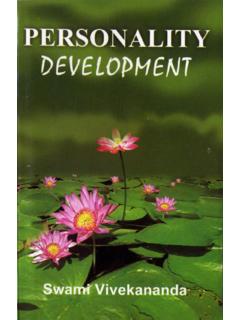
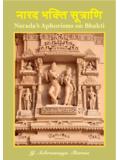
![Taittiriya Upanishad [Sanskrit-English]](/cache/preview/6/2/9/f/4/c/7/b/thumb-629f4c7b56764b8959c1313a86ab6236.jpg)

